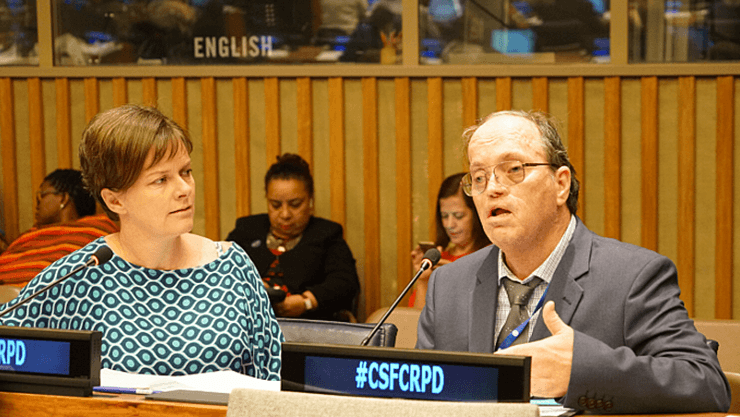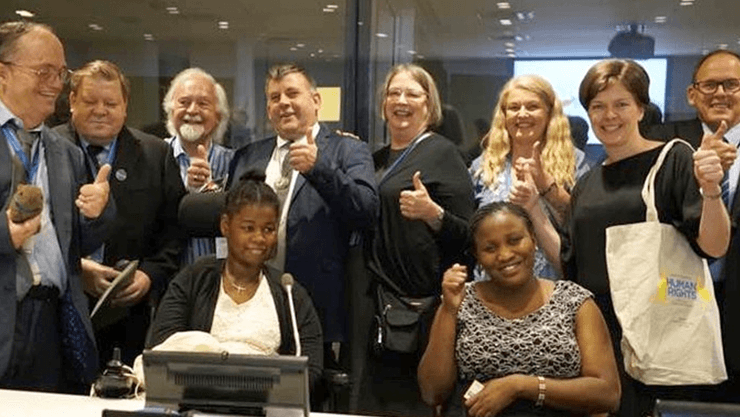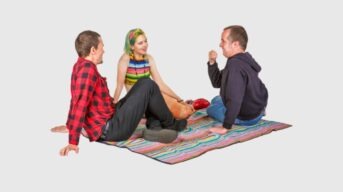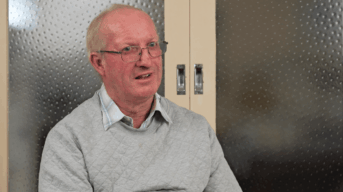
Taking inclusion to the United Nations – and the world!
Council for Intellectual Disability board member Robert Strike has shown the world what inclusion for people with intellectual disability really looks like. Rachel Spencer, our Quality and Inclusion Manager, reports on Robert’s recent trip to the United Nations.
Robert Strike, Kylee Roberts and I had a very successful trip to the United Nations in New York in June.
We were there for the biggest disability meeting in the world, the United Nations’ annual conference for countries that have signed the United Nations Convention on the Rights of Persons with Disabilities.
At the conference, people from countries around the world share ideas and report on work they are doing to promote and protect the rights of people with disability.
Civil society sharing ideas
The first meeting we went to was a forum for civil society. Civil society includes organisations like Council for Intellectual Disability (CID) that are led by and support people with disability, but which are not part of government.
Robert had the honour of being the first speaker from the floor. He shared some of the great work we do at CID. We gave everyone a copy of our Easy Read guide to the conference.
There were over 300 people at the forum. Many people would find it scary talking to such a large crowd, but Robert was so confident and articulate. You can see some of the things he said in the short video below.
People with intellectual disability take the lead
On the last day, Robert led our side event, Leave No One Behind: How to include people with intellectual disability.
All the speakers for the event were people with intellectual disability. They came from Kenya, New Zealand, the USA and Australia.
This is the first time a side event at the conference has been led by people with intellectual disability. It was great to share ideas on how to include people with intellectual disability, and also to show how an inclusive event such as this can be really successful.
More than 70 people came to the event, and we got lots of great feedback.
After the event, people came up to say they learnt a lot from Robert, especially how important it is to let people with intellectual disability speak for themselves.
Genevieve from Keystone Human Services International tweeted “Most important session I attended = Panel of self advocates organized by Robert Strike and his CID colleagues on the importance of, and how to include people with intellectual disability in United Nations meetings and life in general.”

The event included self-advocates Robert Martin from the UN Committee on the Rights of Persons with Disabilities, David King from People First New Zealand, Jayne Akinyi from Inclusion International and Tanya Brown from YAI, USA.
Robert said, “I wanted people to come and learn how to make things better for people with intellectual disabilities – and they did.”
What’s next?
We had a great time in New York. We met some incredible self-advocates – including Robert Martin, who is the first person with an intellectual disability to be included on the United Nations Committee on Rights of Persons with Disabilities, but vows not to be the last!
We learnt a lot and made good connections. We helped others think about how to be more inclusive of people with intellectual disability, and got lots of ideas for how we can improve our own inclusive practice.
Over the next year, Robert will be reporting to the Australian Government on what we learnt, and he will share his experience with other self-advocates at conferences and events in Australia.
CID will also be involved in Australia’s Shadow Report Working Group on the Convention on the Rights of Persons with Disabilities. We will also continue to work with Rosemary Kayess, an Australian who has just been elected to the United Nations Committee on Rights of Persons with Disabilities.
Together, we can make this a more inclusive world.
Find out more
- Read a report on the UN trip in Easy Read
- Leave No One Behind – Easy Read guide to the 11th Conference of State Parties to the Convention on the Rights of Persons with Disability
- View more photos from our time in New York
Thank you to Australian Government Department of Social Services for providing funding for Robert to attend the Conference. Thanks also to Department of Foreign Affairs and Trade, Australian Human Rights Commission and Australian Civil Society for their support.



 1800 424 065
1800 424 065 














